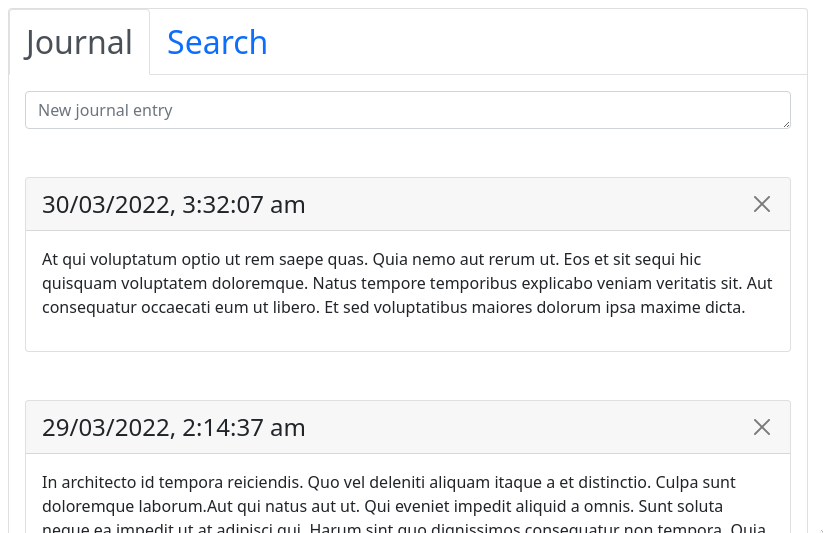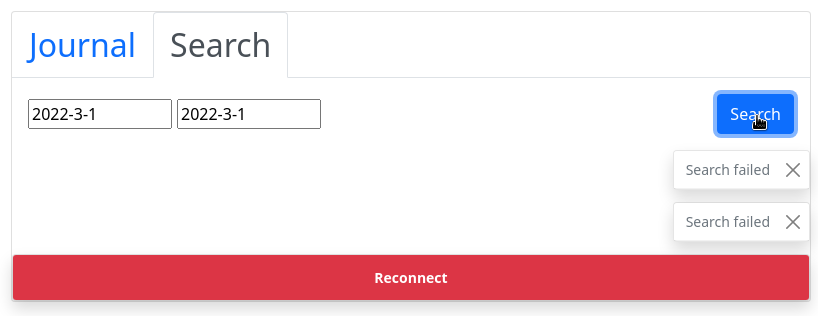With the basic things setup, we can now go over the logic of our app. We'll just focus on functions that are related to ship communications using the Urbit object we previously setup, and ignore UI components and other helper functions.
State
In the previous section we just mentioned the connection status field of our state. Here's the full state of our App:
state = {entries: [], // list of journal entries for displaydrafts: {}, // edits which haven't been submitted yetnewDraft: {}, // new entry which hasn't been submitted yetresults: [], // search resultssearchStart: null, // search query start datesearchEnd: null, // search query end dateresultStart: null, // search results start dateresultEnd: null, // search results end datesearchTime: null, // time of last searchlatestUpdate: null, // most recent update we've receivedentryToDelete: null, // deletion target for confirmation modalstatus: null, // connection status (con, try, err)errorCount: 0, // number of errors so farerrors: new Map(), // list of error messages for display};
We'll see how these are used subsequently.
Initialize
The first thing our app does is call init():
init = () => {this.getEntries().then((result) => {this.handleUpdate(result);this.setState({ latestUpdate: result.time });this.subscribe();},(err) => {this.setErrorMsg("Connection failed");this.setState({ status: "err" });});};
This function just calls getEntries() to retrieve the initial list of journal entries then, if that succeeded, it calls subscribe() to subscribe for new updates. If the initial entry retrieval failed, we set the connection status and save an error message in the errors map. We'll look at what we do with errors later.
Getting entries

The getEntries function scries our %journal agent for up to 10 entries before the oldest we currently have. We call this initially, and then each time the user scrolls to the bottom of the list.
getEntries = async () => {const { entries: e } = this.state;const before = e.length === 0 ? Date.now() : e[e.length - 1].id;const max = 10;const path = `/entries/before/${before}/${max}`;return window.urbit.scry({app: "journal",path: path,});};
The scry is done with the Urbit.scry method. This function takes two arguments in an object:
app- the agent to scry.path- the scry path. Note thecareis not included - all scries through Eyre are%xscries.
The Urbit.scry method only allows JSON results, but note that scries done via direct GET requests allow other marks too.
The Urbit.scry method returns a Promise which will contain an HTTP error message if the scry failed. We handle it with a .then expression back in the function that called it, either init() or moreEntries(). If the Promise is successfuly, the results are passed to the handleUpdate function which appends the new entries to the existing ones in state.
Subscription
A subscription to the /updates path of our %journal agent is opened with our subscribe() function:
subscribe = () => {try {window.urbit.subscribe({app: "journal",path: "/updates",event: this.handleUpdate,err: () => this.setErrorMsg("Subscription rejected"),quit: () => this.setErrorMsg("Kicked from subscription"),});} catch {this.setErrorMsg("Subscription failed");}};
We use the Urbit.subscribe method for this, which takes five arguments in an object:
app- the target agent.path- the%watchpath we're subscribing to.event- a function to handle each fact the agent sends out. We call ourhandleUpdatefunction, which we'll describe below.err- a function to call if the subscription request is rejected (nacked). We just display an error in this case.quit- a function to call if we get kicked from the subscription. We also just display an error in this case.
Note that the Urbit.subscribe method returns a subscription ID number. Since we only have one subscription in our app which we never close, we don't bother to record it. If your app has multiple subscriptions to manage, you may wish to keep track of these IDs in your app's state.
Updates
This handleUpdate function handles all updates we receive. It's called whenever an event comes in for our subscription, and it's also called with the results of getEntries and getUpdates (described later).
It's a bit complex, but basically it just checks whether the JSON object is add, edit, delete, or entries, and then updates the state appropriately. The object it's receiving is just the $update structure converted to JSON by the mark conversion functions we wrote previously.
handleUpdate = (upd) => {const { entries, drafts, results, latestUpdate } = this.state;if (upd.time !== latestUpdate) {if ("entries" in upd) {this.setState({ entries: entries.concat(upd.entries) });} else if ("add" in upd) {const { time, add } = upd;const eInd = this.spot(add.id, entries);const rInd = this.spot(add.id, results);const toE =entries.length === 0 || add.id > entries[entries.length - 1].id;const toR = this.inSearch(add.id, time);toE && entries.splice(eInd, 0, add);toR && results.splice(rInd, 0, add);this.setState({...(toE && { entries: entries }),...(toR && { results: results }),latestUpdate: time,});} else if ("edit" in upd) {const { time, edit } = upd;const eInd = entries.findIndex((e) => e.id === edit.id);const rInd = results.findIndex((e) => e.id === edit.id);const toE = eInd !== -1;const toR = rInd !== -1 && this.inSearch(edit.id, time);if (toE) entries[eInd] = edit;if (toR) results[rInd] = edit;(toE || toR) && delete drafts[edit.id];this.setState({...(toE && { entries: entries }),...(toR && { results: results }),...((toE || toR) && { drafts: drafts }),latestUpdate: time,});} else if ("del" in upd) {const { time, del } = upd;const eInd = entries.findIndex((e) => e.id === del.id);const rInd = results.findIndex((e) => e.id === del.id);const toE = eInd !== -1;const toR = this.inSearch(del.id, time) && rInd !== -1;toE && entries.splice(eInd, 1);toR && results.splice(rInd, 1);(toE || toR) && delete drafts[del.id];this.setState({...(toE && { entries: entries }),...(toR && { results: results }),...((toE || toR) && { drafts: drafts }),latestUpdate: time,});}}};
Add, edit, delete

When a user writes a new journal entry and hits submit, the submitNew function is called. It uses the Urbit.poke method to poke our %journal agent.
submitNew = (id, txt) => {window.urbit.poke({app: "journal",mark: "journal-action",json: { add: { id: id, txt: txt } },onSuccess: () => this.setState({ newDraft: {} }),onError: () => this.setErrorMsg("New entry rejected"),});};
The Urbit.poke method takes five arguments:
appis the agent to poke.markis the mark of the data we're sending. We specify"journal-action", so Eyre will use the/mar/journal/action.hoonmark we created to convert it to a$actionstructure with a%journal-actionmark before it's delivered to our agent.jsonis the actual data we're poking our agent with. In this case it's the JSON form of the%add$action.onSuccessis a callback that fires if we get a positive ack in response. In this case we just clear the draft.onErroris a callback that fires if we get a negative ack (nack) in response, meaning the poke failed. In this case we just set an error message to be displayed.
onSuccess and onError are optional, but it's usually desirable to handle these cases.
The delete and submitEdit functions are similar to submitNew, but for the %del and %edit actions rather than %add:

submitEdit = (id, txt) => {if (txt !== null) {window.urbit.poke({app: "journal",mark: "journal-action",json: { edit: { id: id, txt: txt } },onError: () => this.setErrorMsg("Edit rejected"),});} else this.cancelEdit(id);};

delete = (id) => {window.urbit.poke({app: "journal",mark: "journal-action",json: {"del": {"id": id}},onError: ()=>this.setErrorMsg("Deletion rejected")})this.setState({rmModalShow: false, entryToDelete: null})};
Note that whether we're adding, editing or deleting entries, we update our state when we receive the update back on the /updates subscription, not when we poke our agent.
Search

When searching for entries between two dates, the getSearch function is called, which uses the Urbit.scry method to scry for the results in a similar fashion to getEntries, but using the /x/entries/between/[start]/[end] endpoint.
getSearch = async () => {const { searchStart: ss, searchEnd: se, latestUpdate: lu } = this.state;if (lu !== null && ss !== null && se !== null) {let start = ss.getTime();let end = se.getTime();if (start < 0) start = 0;if (end < 0) end = 0;const path = `/entries/between/${start}/${end}`;window.urbit.scry({app: "journal",path: path,}).then((result) => {this.setState({searchTime: result.time,searchStart: null,searchEnd: null,resultStart: ss,resultEnd: se,results: result.entries,});},(err) => {this.setErrorMsg("Search failed");});} else {lu !== null && this.setErrorMsg("Searh failed");}};
Error handling
When the channel connection is interrupted, the Urbit object will begin trying to reconnect. On each attempt, it sets the connection status to "try", as we specified for the onRetry callback. When this is set, a "reconnecting" message is displayed at the bottom of the screen:

If all three reconnection attempts fail, the onError callback is fired and we replace the "reconnecting" message with a "reconnect" button:

When clicked, the following function is called:
reconnect = () => {window.urbit.reset();const latest = this.state.latestUpdate;if (latest === null) {this.init();} else {this.getUpdates().then((result) => {result.logs.map((e) => this.handleUpdate(e));this.subscribe();},(err) => {this.setErrorMsg("Connection failed");this.setState({ status: "err" });});}};
Our reconnect() function first calls the Urbit.reset method. This closes the channel connection, wipes event counts and subscriptions, and generates a new channel ID. We could have tried reconnecting without resetting the connection, but we don't know whether the channel still exists. We could time how long the connection has been down and estimate whether it still exists, but it's easier to just start fresh in this case.
Since we've reset the channel, we don't know if we've missed any updates. Rather than having to refresh our whole state, we can use the getUpdates() function to get any missing update:
getUpdates = async () => {const { latestUpdate: latest } = this.state;const since = latest === null ? Date.now() : latest;const path = `/updates/since/${since}`;return window.urbit.scry({app: "journal",path: path,});};
This function uses the Urbit.scry method to scry the /x/updates/since/[since] path, querying the update $log for entries more recent than latestUpdate, which is always set to the last logged action we received. The getUpdates function returns a Promise to the reconnect function above which called it. The reconnect function handles it in a .then expression, where the success case passes each update retrieved to the handleUpdate function, updating our state.
Lastly, as well as handling channel connection errors, we also handle errors such as poke nacks or failed scries by printing error messages added to the error map by the setErrorMsg function. You could of course handle nacks, kicks, scry failures, etc differently than just printing an error, it depends on the needs of your app.

Resources
HTTP API Guide - Reference documentation for
@urbit/http-api.React app source code - The source code for the Journal app UI.
@urbit/http-apisource code - The source code for the@urbit/http-apiNPM package.